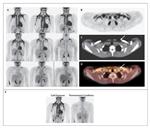 |
 |
 |
||
    |
||||
|
||||

"Brown fat" may help adults lose weight
|
|
Reuters Health
Wednesday, April 8, 2009

BOSTON (Reuters) - A sparse form of fat that helps keep newborns warm is more common in adults than previously thought and that discovery that could lead to a new way to lose weight, researchers said on Wednesday.
Once activated by cold temperatures, so-called brown fat burns calories faster than regular fat. It is normally so dormant in adults that there has been debate over how much adults have or whether they have it at all.
In three studies in Thursday's New England Journal of Medicine, researchers report finding brown fat in most adults and discovering they can detect it by exposing people to cold. In some cases, adults who had more active areas of brown fat were thinner.
The hope is that if a way can be found to activate this brown fat and get the body to make more of it, people could burn off extra calories without additional exercise.
"Fifty grams of maximally activated brown fat accounts for 20 percent of your resting energy expenditure," Dr. Aaron Cypress of the Joslin Diabetes Center in Boston, who led one of the studies, said in an interview. "If you add that up, that's 400 or 500 calories per day.
"Practically speaking, we have a great potential to have a new treatment in our armamentarium against diabetes and obesity."
Dr. Kirsi Virtanen of the University of Turku in Finland and colleagues used positron emission tomography, known as PET scans, to find active brown fat deposits in five volunteers and also took little plugs of both types of fat. Brown fat became more active when the volunteers were cold, they reported.
"If the brown adipose tissue in this example were fully activated, it would burn an amount of energy equivalent to approximately 4.1 kg (9 pounds) of adipose tissue over the course of a year," researchers wrote.
OBESE PEOPLE HAVE LESS
A team at Maastricht University Medical Center in the Netherlands found obese men had less brown fat than lean men.
"Taken together, these studies point to a potential 'natural' intervention to stimulate energy expenditure: turn down the heat and burn calories (and reduce the carbon footprint in the process)," Dr. Francesco Celi of the National Institute of Diabetes and Digestive and Kidney Disease in Bethesda, Maryland wrote in a commentary.
But Celi cautioned that the vision may be oversimplified.
Cypress said scientists must first find a way to activate brown fat and, perhaps, even persuade the body to make more of it. In addition, the new studies did not directly test whether activating this fat would make people lose weight.
Celi said further research may reveal that even if brown fat is activated, the body may find a way to compensate by getting people to eat more.
"If you think about it, if you eat three donuts, you hit that calorie count right there," Cypress said.
"Using brown fat to treat obesity has been talked about for 30 or 40 years," he said. "But people essentially gave up on it. Many said it didn't exist in adult human beings and many said it didn't have any connection to obesity and weight at all. What these studies show is that virtually every adult human being has functional brown fat in them."
(Editing by Maggie Fox and Bill Trott)
Reuters Health
© 2009 Thomson Reuters. All rights reserved. Reuters content is the intellectual property of Thomson Reuters or its third party content providers. Any copying, republication or redistribution of Reuters content, including by framing or similar means, is expressly prohibited without the prior written consent of Thomson Reuters. Thomson Reuters shall not be liable for any errors or delays in content, or for any actions taken in reliance thereon. "Reuters" and the Reuters Logo are trademarks of Thomson Reuters and its affiliated companies. For additional information on other Reuters media services please visit http://about.reuters.com/media/.
Related News:
More News on this Date
Related MedlinePlus Pages:
| Home | Health Topics | Drugs & Supplements | Encyclopedia | Dictionary | News | Directories | Other Resources | |
| Disclaimers | Copyright | Privacy | Accessibility | Quality Guidelines U.S. National Library of Medicine, 8600 Rockville Pike, Bethesda, MD 20894 National Institutes of Health | Department of Health & Human Services |
Date last updated: 09 April 2009 |
